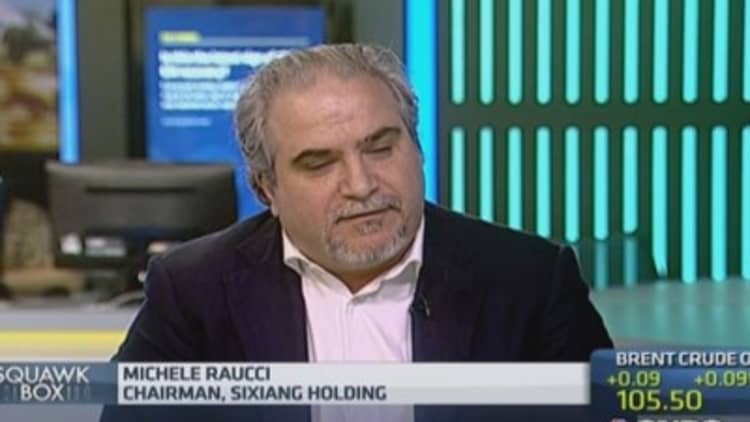The European Central Bank (ECB) is expected to hold fire at its monetary policy meeting this week, despite a shock fall in inflation reigniting deflation concerns.
It came as something of a shock to most economists – and likely the ECB – when official figures released last week showed that euro zone inflation fell more than expected in July.
Inflation rose by 0.4 percent compared to the same period last year, failing to match expectations of 0.5 percent. It was the lowest level seen since October 2009 and below last month's reading of 0.5 percent.
Read MoreIMF's Lagarde urges ECB to consider QE
The region's continuing sluggish growth saw the ECB unveil a host of measures at its June meeting designed to give the euro zone's recovery a boost.
But July's disappointing inflation data has boosted concerns that the region is heading towards a period of deflation, with even French President Francois Hollande telling Le Monde newspaper on Monday: "There is a real deflation risk in Europe… The ECB must take all the necessary measures to inject liquidity into the economy."
Despite calls for action by Hollande and numerous economists, ECB President Mario Draghi is unlikely to unveil any further stimulus at the bank's policy meeting on Thursday, as he waits for June's interest rate cuts and a new loan program – dubbed the TLTRO - to take effect.
Read MoreDraghi announces host of stimulus measures
"The ECB seems bound to not move a muscle at the Thursday meeting following June's easing package, whose centerpiece (the TLTRO program) starts in September," Daiwa economists said in a note.
"But last week's renewed drop in euro area inflation… is certainly starting to squeeze the Governing Council's ability to put up a united front, stick to their guns and simply hope for the best."

Beyond these inflation figures, however, data for the euro zone has painted a mixed picture in recent weeks.
The closely-watched composite Purchasing Managers' Index from Markit, for instance, came in at 53.9 for July on Tuesday. This was below flash estimates of 54, although it marked an uptick from June (with a reading above 50 indicating expansion).
Retail sales, meanwhile, grew at their fastest annual pace in seven years in June, according to separate data released Tuesday. Sales rose by 2.4 percent year-on-year in June, way above estimates of 1.2 percent, and met expectations on the month, rising by 0.4 percent.
It came after a marked drop in joblessness across the euro zone in June, with the unemployment rate falling to a 21-month low of 11.5 percent.
Read MoreECB surprises with meeting changes, minutes
Howard Archer, chief European economist at IHS Global Insight, stressed that this data "dilutes some of the pressure for any further near-term ECB action."
More good news for the ECB comes in the guise of a weaker euro, whose rise against the dollar over recent months had seemed unshakeable. Between the start of January 2013 and its recent peak in March 2014, the euro had risen over 5.5 percent. Since this peak, it has slipped close to 3 percent.
A stronger euro makes euro zone exports more expensive in the global market, thereby hindering the euro zone's efforts to grow and regain its competitiveness.
"The ECB's Governing Council will be pleased to note that the persistent strength of the euro finally appears to be giving way," Anatoli Annenkov, senior European economist at Societe Generale, said in a research document
"While the exchange rate is not a target for the ECB, the euro strength over the past year has undoubtedly not been helpful in an environment of decelerating food and energy prices, as well as weak demand."
But although the pressure may be off the ECB – for this month at least – the central bank can't rest on its laurels, according to Rabobank economists.
"Recent measures have shielded the euro zone periphery from what could have been a much more significant widening pressures in the face of rising market volatility, but they may offer only a temporary reprieve," they wrote in a note.
"Recent data releases in the euro zone and rising geopolitical concerns certainly point at heightened downside risks for the second half of this year."


